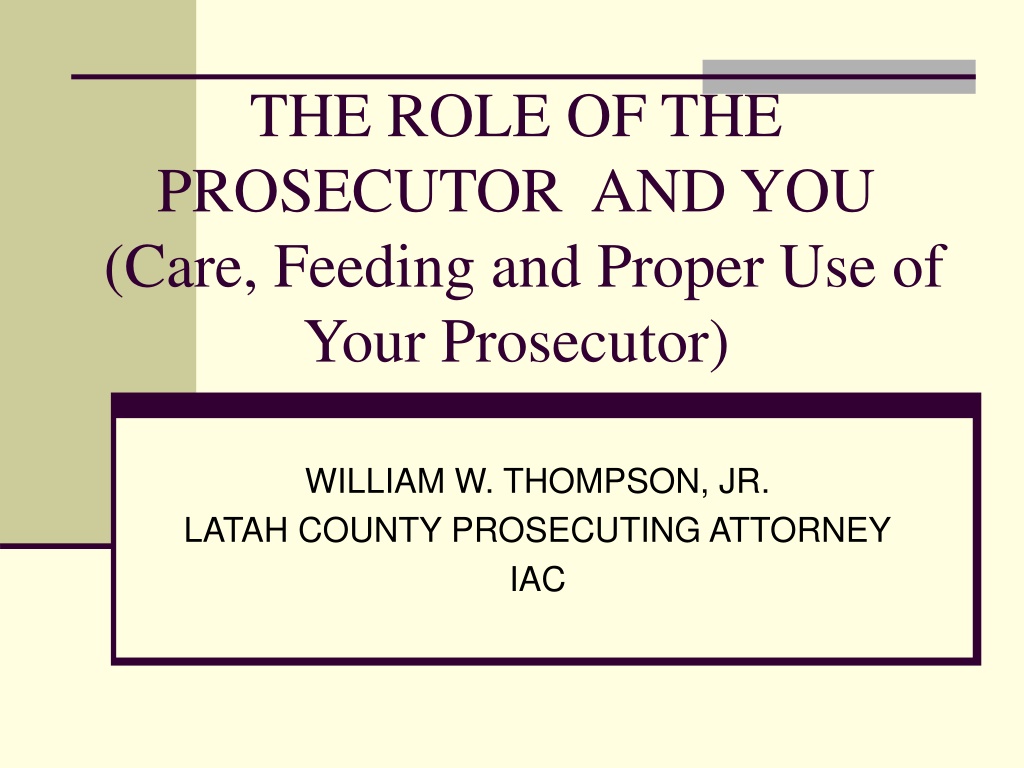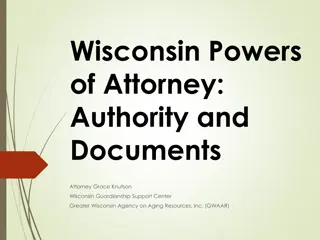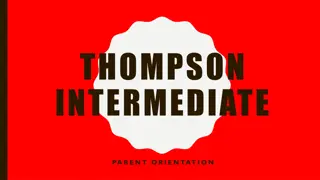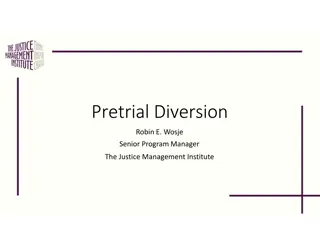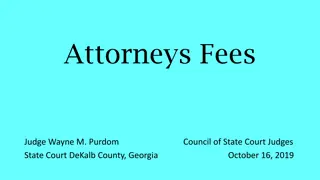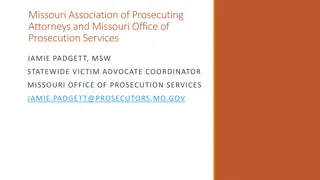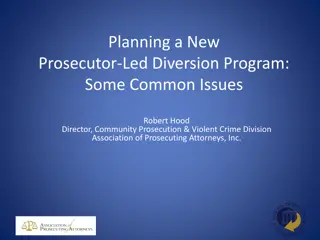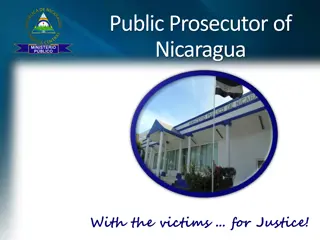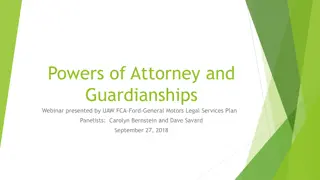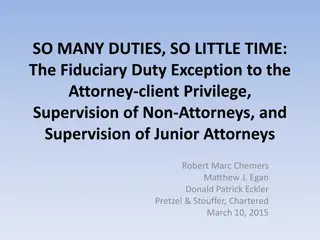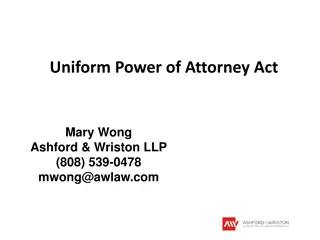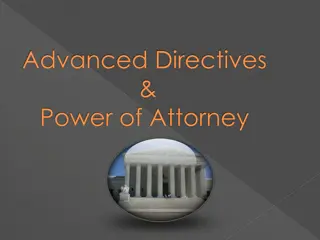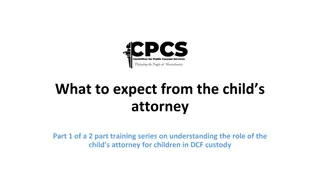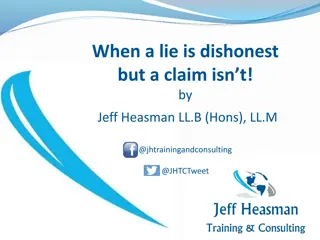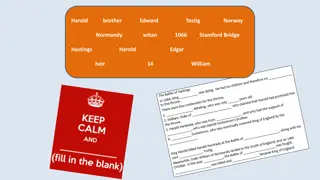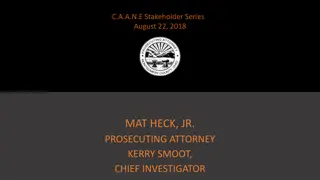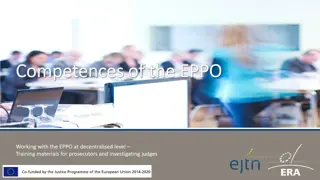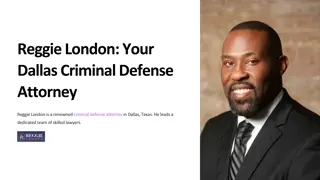Understanding the Role of a Prosecutor: William W. Thompson, Jr. Latah County Prosecuting Attorney
In this informative text, the duties and responsibilities of a prosecuting attorney, exemplified by William W. Thompson, Jr. of Latah County, are discussed. The loyalty oath, statutes, and primary responsibilities associated with the role of a prosecutor are highlighted, emphasizing legal and proper conduct at all times.
Download Presentation

Please find below an Image/Link to download the presentation.
The content on the website is provided AS IS for your information and personal use only. It may not be sold, licensed, or shared on other websites without obtaining consent from the author. Download presentation by click this link. If you encounter any issues during the download, it is possible that the publisher has removed the file from their server.
E N D
Presentation Transcript
THE ROLE OF THE PROSECUTOR AND YOU (Care, Feeding and Proper Use of Your Prosecutor) WILLIAM W. THOMPSON, JR. LATAH COUNTY PROSECUTING ATTORNEY IAC
STATUTES I.C. 59-401. LOYALTY OATH -- FORM. Before any officer elected or appointed to fill any office created by the laws of the state of Idaho enters upon the duties of his office, he must take and subscribe an oath, to be known as the official oath, which is as follows: "I do solemnly swear (or affirm, as the case may be) that I will support the Constitution of the United States, and the Constitution of the State of Idaho, and that I will faithfully discharge the duties of (insert office) according to the best of my ability."
STATUTES 31-2604. DUTIES OF PROSECUTING ATTORNEY. It is the duty of the prosecuting attorney:
STATUTES 31-2604. DUTIES OF PROSECUTING ATTORNEY. It is the duty of the prosecuting attorney: 3. To give advice to the board of county commissioners, and other public officers of his county, when requested in all public matters arising in the conduct of the public business entrusted to the care of such officers.
STATUTES 31-2001. COUNTY OFFICERS ENUMERATED. The officers of a county are: 1. A sheriff. 2. A clerk of the district court, who shall be ex officio auditor and recorder, and ex officio clerk of the board of county commissioners. 3. An assessor. 4. A prosecuting attorney. 5. A county treasurer, who shall be ex officio public administrator and ex officio tax collector. 6. A coroner. 7. Three (3) members of the board of county commissioners.
STATUTES 31-2227. ENFORCEMENT OF PENAL LAWS PRIMARY RESPONSIBLITY 1. Irrespective of police powers vested by statute in state, county and municipal officers, and except where otherwise provided in Idaho Code, it is hereby declared to be the policy of the state of Idaho that the primary duty of enforcing all the penal provisions of any and all statutes of this state, in any court, is vested in the sheriff and prosecuting attorney of each of the several counties. When, in the judgment of such county officers, they need assistance from municipal peace officers within the county, they are authorized and directed to call for such assistance and local officers shall render assistance.
STATUTES 31-2607. ADVISER OF COUNTY COMMISSIONERS. The prosecuting attorney is the legal adviser of the board of commissioners; he must attend their meetings when required, and must attend and oppose all claims and accounts against the county when he deems them unjust or illegal.
STATUTES 31-2607. ADVISER OF COUNTY COMMISSIONERS. The prosecuting attorney is the legal adviser of the board of commissioners; he must attend their meetings when required, and must attend and oppose all claims and accounts against the county when he deems them unjust or illegal. The Board of County Commissioners is the prosecutor s primary client.
ADVICE Legal advice and policy advice are not necessarily the same.
ADVICE All policy decisions have potential legal consequences
ADVICE Legal advice should be the foundation for all policy decisions.
ADVICE Legal advice is the Prosecutor's responsibility.
ADVICE Legal advice is the Prosecutor's responsibility. Policy decisions are your responsibility.
LEGAL vs. POLICY Easy = the law says you can/cannot do __________________
LEGAL vs. POLICY Easy = the law says you can/cannot do __________________ More difficult (challenging) = maybe, more likely ____________ than _____________, it s not clear . . .
ATTORNEY/CLIENT PRIVILEGE Idaho Rule of Evidence 502(b) A client or a lawyer (for a client) has a privilege to refuse to disclose and to prevent any other person from disclosing confidential communications made for the purpose of facilitating the rendition of professional legal services . . .
ATTORNEY/CLIENT PRIVILEGE Idaho Code 9-203(2) - An attorney cannot, without the consent of his client, be examined as to any communication made by the client to him, or his advice given thereon in the course of professional employment. The word client used herein shall be deemed to include a person, a corporation or an association.
ATTORNEY/CLIENT PRIVILEGE Idaho Rules of Professional Conduct 1.6(a) A lawyer may not reveal information relating to representation of a client unless the client gives informed consent, the disclosure is impliedly authorized in order to carry out the representation or the disclosure is permitted by paragraph (b).
ATTORNEY/CLIENT PRIVILEGE Idaho Rules of Evidence 502(d) exceptions: (1) Furtherance of crime or fraud. If the services of the lawyer were sought or obtained to enable or aid anyone to commit or plan to commit what the client knew or reasonably should have known to be a crime or fraud; (3) Breach of duty by a lawyer or client. As to a communication relevant to an issue of breach of duty by the lawyer to the lawyer's client or by the client to the client's lawyer;
ATTORNEY/CLIENT PRIVILEGE Idaho Rules of Professional Conduct 1.6(b) exceptions: (1) to prevent the client from committing a crime, including disclosure of the intention to commit a crime; (2) to prevent reasonably certain death or substantial bodily harm;
ATTORNEY/CLIENT PRIVILEGE Idaho Rules of Professional Conduct 1.6(b) exceptions: (3) to prevent, mitigate or rectify substantial injury to the financial interests or property of another that is reasonably certain to result or has resulted from the client's commission of a crime in furtherance of which the client has used the lawyer's services;
ATTORNEY/CLIENT PRIVILEGE Idaho Rules of Professional Conduct 1.6(b) exceptions: (5) to establish a claim or defense on behalf of the lawyer in a controversy between the lawyer and the client, to establish a defense to a criminal charge or civil claim against the lawyer based upon conduct in which the client was involved, or to respond to allegations in any proceeding concerning the lawyer's representation of a client;
ATTORNEY/CLIENT PRIVILEGE Consent
PURPOSE OF ATTORNEY/CLIENT PRIVILEGE Allows open, honest conversation.
PURPOSE OF ATTORNEY/CLIENT PRIVILEGE Allows open, honest conversation. Helps insure well-considered decisions.
PURPOSE OF ATTORNEY/CLIENT PRIVILEGE Allows open, honest conversation. Helps insure well-considered decisions. Protects work product (thoughts/analysis/ weighing of pros and cons/etc.).
EXECUTIVE SESSION 74-206. EXECUTIVE SESSIONS -- WHEN AUTHORIZED. (d) To consider records that are exempt from disclosure as provided in chapter 3, title 9, Idaho Code;
EXECUTIVE SESSION 74-206. EXECUTIVE SESSIONS -- WHEN AUTHORIZED. (d) To consider records that are exempt from disclosure as provided in chapter 3, title 9, Idaho Code; I.C. 74-104. RECORDS EXEMPT FROM DISCLOSURE -- EXEMPTIONS IN FEDERAL OR STATE LAW -- COURT FILES OF JUDICIAL PROCEEDINGS. (1) Any public record exempt from disclosure by . . . state law . . .
EXECUTIVE SESSION I.C. 9-203(2) STATUTORY ATTORNEY/CLIENT PRIVILEGE. An attorney cannot, without the consent of his client, be examined as to any communication made by the client to him, or his advice given thereon in the course of professional employment. The word client used herein shall be deemed to include a person, a corporation or an association.
EXECUTIVE SESSION I.C. 74-107(11) RECORDS EXEMPT FROM DISCLOSURE -- (11) Records of any risk retention or self- insurance program prepared in anticipation of litigation or for analysis of or settlement of potential or actual money damage claims against a public entity and its employees or against the industrial special indemnity fund except as otherwise discoverable under the Idaho or federal rules of civil procedure. These records shall include, but are not limited to, claims evaluations, investigatory records, computerized reports of losses, case reserves, internal documents and correspondence relating thereto. At the time any claim is concluded, only statistical data and actual amounts paid in settlement shall be deemed a public record unless otherwise ordered to be sealed by a court of competent jurisdiction. Provided however, nothing in this subsection is intended to limit the attorney client privilege or attorney work product privilege otherwise available to any public agency or independent public body corporate and politic.
EXECUTIVE SESSION I.C. 74-206(1) - EXECUTIVE SESSIONS - - WHEN AUTHORIZED. - (f) To communicate with legal counsel for the public agency to discuss the legal ramifications of and legal options for pending litigation, or controversies not yet being litigated but imminently likely to be litigated. The mere presence of legal counsel at an executive session does not satisfy this requirement;
BEST PRACTICE Have something in writing.
3RDPARTIES Prosecutors should not give legal advice to private citizens
3RDPARTIES Prosecutors should not give legal advice to private citizens May provide information
3RDPARTIES Prosecutors should not give legal advice to private citizens May provide information May refer (to a private attorney, law enforcement, etc.)
3RDPARTIES Prosecutors should not give legal advice to private citizens May provide information May refer (to a private attorney, law enforcement, etc.) Exception: part-time prosecutors may represent and advise 3rdparties so long as there is no conflict with his/her public duties
3RDPARTIES Prosecutor s duty is to BOCC and elected officials
3RDPARTIES Prosecutor s duty is to BOCC and elected officials Avoid potential conflicts of interest
3RDPARTIES Prosecutor s duty is to BOCC and elected officials Avoid potential conflicts of interest Avoid potentially lending the county s credibility to a private dispute
3RDPARTIES If referring a third party to the prosecutor's office, give us a heads up.
SPECIALIZED SERVICES Would you hire a divorce lawyer in a DUI case?
SPECIALIZED SERVICES Would you hire a divorce lawyer in a DUI case? hire a DUI lawyer for a real estate transaction?
SPECIALIZED SERVICES Would you hire a divorce lawyer in a DUI case? hire a DUI lawyer for a real estate transaction? hire a real estate lawyer for a personal injury lawsuit?
SPECIALIZED SERVICES Prosecutors are generally most experienced in Criminal law General government/civil law
SPECIALTY AREAS Bond attorneys Water law attorneys Insurance defense attorneys Deferred compensation plan specialists Etc.
